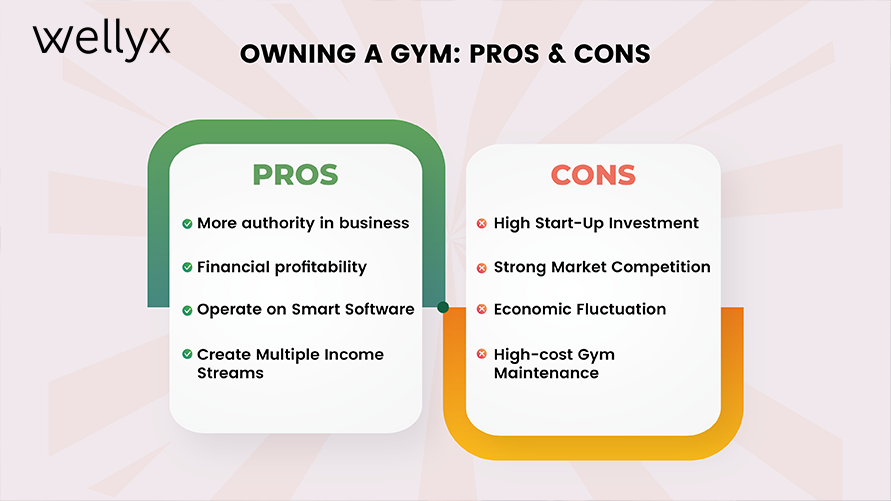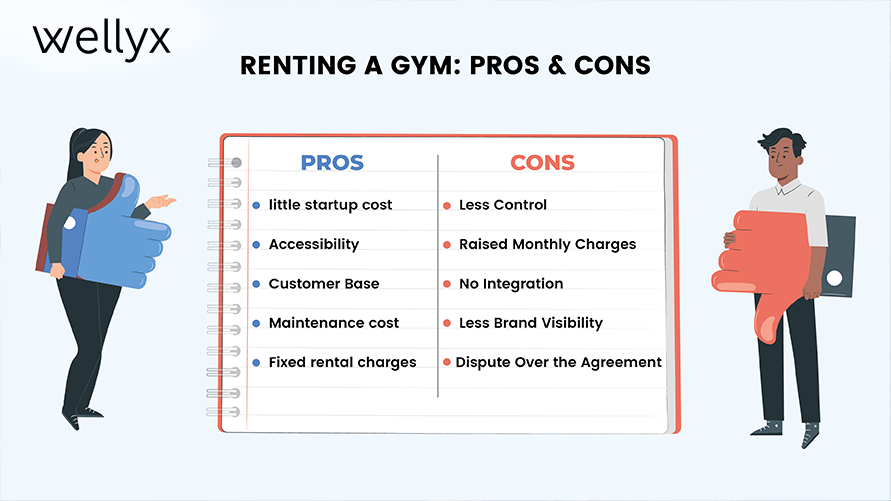Owning and renting a gym is equally fulfilling and thrilling for fitness freaks starting their fitness business. If you are overwhelmed about owning vs renting gym, know the highs and lows of each for a better move.
Since growth and profit are the ultimate goals of fitness enthusiasts starting their businesses, consider the essential factors and business models that suit you. No matter if you start the gym from scratch and rent or own the gym location. What matters the most is business growth and profitability!
If you are stuck about owning or renting a gym space, it is better to see a clear picture of the good and bad aspects of both. So, let’s get started without ado!
Owning a gym: pros and cons

Undoubtedly, where owning a gym is highly lucrative, it demands excellent strategic planning. When starting a gym business from scratch, crafting a business plan according to your startup budget is essential.
Additionally, an in-depth consideration of the fitness industry dynamics is significant. For this reason, you will need to make a decision to buy or lease gym space. As buying a gym is directly related to the business model, consider the pros and cons of owning a gym:
Pros of owning a gym
Owning a gym space offers lots of benefits. They are as follows:
- Offers more autonomy and freedom to achieve the set business goals
- More profitability and potential growth
- Expand the revenue streams such as retail stores, gym memberships, and online training programs
- Integrate gym management software to manage operations from front to back end
- Build a fitness community of your own with personal trainers and famous fitness freaks
- Set your unique brand image through creative marketing strategies
- Innovate and implement new ideas in your fitness services and offers
Cons of owning a gym
Where it is beneficial, there are some cons as well. Here are some of them:
- Requires a considerable capital for quality equipment, including setup and operating expenses
- Increasing market competition demands unwavering efforts to shine out
- The slightest dip in the economic situation affects the business
- Demands maintenance of gym equipment and space
- Retaining gym members is quite challenging in the long-term
- Managing expense and profit costs at a higher level is energy and time-consuming
- The geographic location of the gym determines the visibility and success
| Owning a gym | |
| Pros | Cons |
| More authority in business | High start-up investment |
| Financial profitability | Strong market competition |
| Operate on smart software | High-cost gym maintenance |
| Create multiple income streams | Economic fluctuation |
Renting a gym: pros and cons

Undoubtedly, renting a gym space is the stepping stone for your own gym. Fitness enthusiasts can start their personal training programs using a rental space at a smaller level. Additionally, starting a gym business with a small investment and a well-thought-out business plan is easier.
Moreover, renting a gym space saves the expenses of equipment and staff payrolls, as everything is set in the legal agreement. Most gym owners rent out their gym space in their free slots, which puts both the renter and rentee in a win-win situation.
Pros of renting a gym
Here are some of the pros of renting a gym space
- Requires usually a little startup cost
- More accessibility to prime locations and quality equipment
- Easier to build a customer base in a functional gym
- Saves monthly gym maintenance cost
- Fixed rental charges are according to the agreement
- Lease gym equipment to start the personal training programs
Cons of renting a gym
The cons of renting a gym are as follows:
- Less control over the gym space and business
- Surprise or raised monthly charges affect the profit share
- No integration of smart software in managing operations
- Less brand visibility of the gym business
- The likelihood of a dispute over the agreement
| Renting a gym | |
| Pros | Cons |
| Start with a small start-up cost | Less autonomy |
| Access to prime locations | Hidden costs and financial commitments |
| Access to gym equipment | Limited customization due to limitations |
| Works on client referrals | No solid branding or marketing |
Owning vs renting gym: a clear comparison
Where starting a gym business sounds lucrative, it is essential to consider the startup cost, business plan, and goals to achieve in the long term. In addition, the capital to start a gym determines whether to buy or lease the gym space. It even simplifies the creation of a gym business plan.
Moreover, it is crucial to consider the pros and cons of each to make a better decision. Here is a table to help you decide whether to buy or rent a gym if you want to start your fitness business:
| Owning vs renting gym | ||
| Factors | Owning a gym | Renting a gym |
| Initial cost | High capital investment | Low investment (can start right away) |
| Autonomy | More control over business | Less authority and more limitations |
| Profitability | Highly lucrative | Profit and risk go hand-in-hand |
| Maintenance | High-cost maintenance | Depends on insurance and agreement |
| Marketing | Strong branding required | Works on referral or word-of-mouth |
| Technological integration | Optimize gym operations using gym management software | Less likelihood of integrating software |
| Other revenue streams | More income streams to grow | No other income stream |
| Market competition | Always in a rush to stay ahead | Moving at its own pace |
Bottom Line
To conclude, the gym fitness industry is growing potentially faster than ever before. Initiating a gym business, whether small or large, is highly lucrative. If you have substantial capital, buy your gym space and craft your business plan according to your goals.
On the other hand, if you are setting a cornerstone with a small investment, you can start by renting a gym space. You can expand your gym business once the gym gets into the competition race. Lastly, owning vs renting gym space has pros and cons, so decide what suits your business goals best!